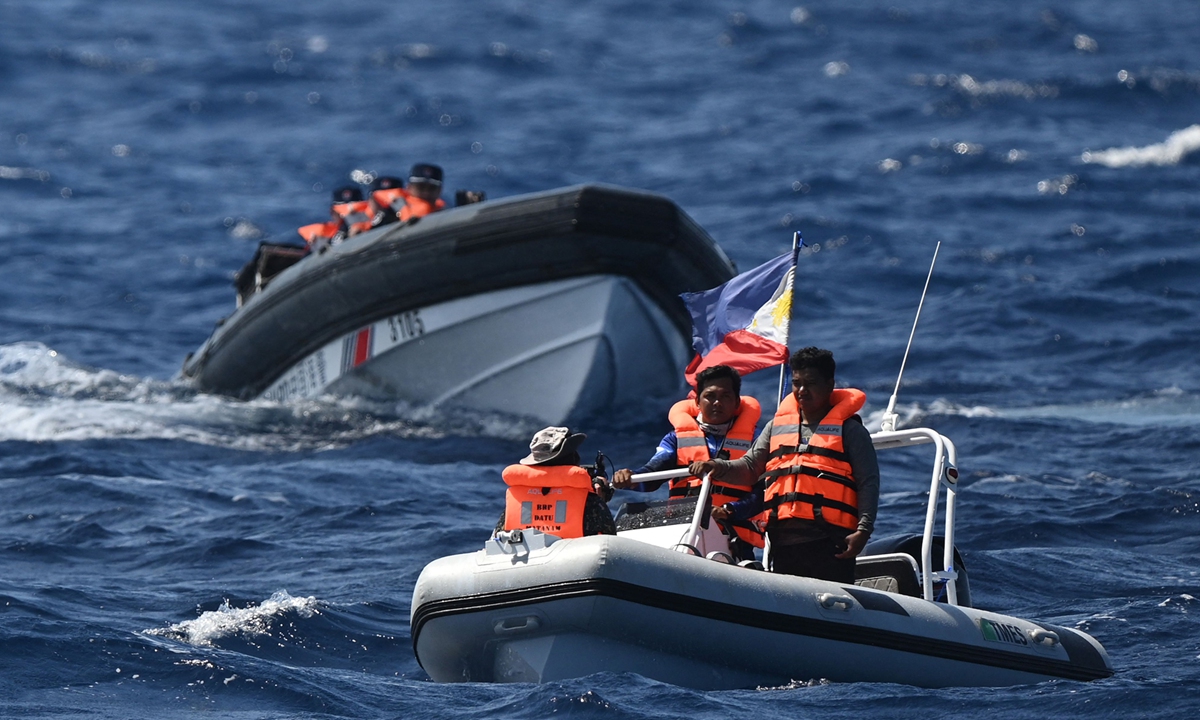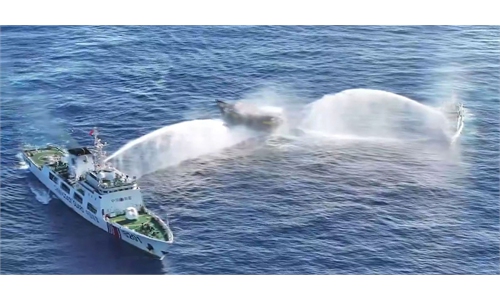China firmly opposes passage of Philippine maritime bill that solidifies illegal S.China Sea arbitral ruling

China Coast Guard expels Philippine vessel for illegal intrusion into South China Sea waters after repeated warnings on February 15, 2024. Photo: Visual News
China firmly opposes attempts by the Philippines to solidify the illegal ruling of the South China Sea arbitration through domestic legislation, which unlawfully includes China's Huangyan Island and most of the islands and reefs in the Nansha Islands in its maritime jurisdiction, the Chinese Foreign Ministry spokesperson said on Tuesday in response to the passage of the Philippine Maritime Zones Bill.
The move has severely violated China's territorial sovereignty and maritime rights and interests in the South China Sea, and China has lodged solemn démarches to the Philippines, Mao Ning said at Tuesday's routine media briefing.
The Philippine Senate recently approved the Philippine Maritime Zones Bill on the third and final reading. Once enacted, the bill is expected to declare the country's maritime zones based on the standards set by the UN Convention on the Law of the Sea (UNCLOS) and eventually the 2016 Arbitral Ruling, which the Chinese side slammed "a political farce concocted by the US."
The Department of Foreign Affairs of Philippines said the bill would "codify the status and regime of the waters inside the archipelagic baselines and redefine the extent of Philippine territorial sea, including the contiguous zone," the Philippine News Agency reported.
Mao reiterated that China has sovereignty over the Nansha Islands, Zhongsha Islands, including Huangyan Island, and their adjacent waters.
China's above-mentioned sovereignty, rights and interests in the South China Sea were established in the long course of history, and are solidly grounded in history and the law, which are in compliance with the UN Charter and international law, including the UNCLOS, Mao said.
The spokesperson continued that the territory of the Philippines is defined by a series of international treaties. China's Huangyan Island and other islands and reefs of Nansha Islands are completely beyond the limits of the Philippines' territory. Its illegal occupation of a number of islands in the Nansha Islands has seriously violated international law, including the UN Charter.
The Philippines has also arbitrarily went beyond its territorial scope to set up the so-called Kalayaan Island Group, which has violated China's territorial sovereignty.
"This is illegal, null and void," stressed Mao.
What's more, without the Chinese government's prior consent, the Philippines unilaterally initiated an international arbitration, which violated international law, including UNCLOS, the spokesperson said.
The arbitral tribunal in the South China Sea arbitration handled the case ultra vires and made an illegitimate ruling. The rendered award is illegal, null and void. China neither accepts nor participates in that arbitration, neither accepts nor recognizes the award, and will never accept any claim or action arising from the award, Mao said.
China's territorial sovereignty and maritime rights and interests in the South China Sea will not be affected by the award in any way, she added.
Stressing that territorial sovereignty is the precondition and foundation for the generation of maritime rights and interests, Mao said the Philippines, under the pretext of implementing UNCLOS, has advanced the legislation of the "Maritime Zones Act" in an attempt to put a legal veneer on its illegal claims and actions in the South China Sea.
Such an "Act" goes against the provisions of international law, including the UN Charter and UNCLOS, and against the spirit of the Declaration on the Conduct of Parties in the South China Sea. "This completely horrendous act will inevitably make the situation in the South China Sea more complex," Mao stressed.
The Chinese side urged the Philippines to respect China's territorial sovereignty and maritime rights and interests in good faith, immediately end any unilateral move that may escalate the dispute and complicate the situation, Mao noted.
She also called upon Manila to return to the right track of properly settling differences through negotiation and consultation as soon as possible and work with China to uphold the larger interest of the bilateral relations and keep the South China Sea peaceful and stable.
Also on Tuesday, the Philippines broke its promise and intentionally sent two coast guard ships and two cargo ships to trespass into waters off Ren'ai Reef in China's Nansha Islands to send supplies to its illegally grounded warship, Gan Yu, a spokesperson at the China Coast Guard (CCG), said in a statement on Tuesday.
China took restriction measures, including the use of water cannon, against the trespassing vessels. However, despite repeated warnings, a Filipino ship intentionally rammed into a Chinese ship in an unprofessional and dangerous manner and led to minor damage, and the responsibility lies completely with the Philippine side, Gan said.
Global Times

